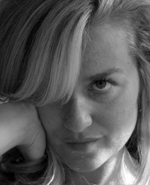 Antonia Quirke began as an eccentric young film critic who held jobs briefly in all areas of the media before getting fired and moving on in her Citroen 2CV held together only by its paint-job to find the next unsuitable boyfriend with whom to share her house-boat. We know all this because eventually she wrote a novel (her first book, if you don’t count a slim but richly argued BFI pamphlet about Jaws) narrated by a character who has all those characteristics and is named “Antonia Quirke”. There are a few reasons for thinking that the character in the book is not exactly the same as the writer: in real life the Citroen 2CV broke in half, and anyway no personality so fully dysfunctional could possibly have finished writing the novel, or even started it. Also the novel is continually and inventively funny, and it takes objectivity to do that. The novel is called Madame Depardieu and the Beautiful Strangers. It was originally called Choking on Marlon Brando – a title it retains in America – but when Antonia Quirke, or possibly “Antonia Quirke”, was told that the original title was perfect, she changed it. The possibility that she is as unhinged as her car, however, is ruled out by the precision of the novel’s texture, which keeps the three chief virtues of her journalism: brevity, an unstrained colloquial vocabulary, and strict observation.
Antonia Quirke began as an eccentric young film critic who held jobs briefly in all areas of the media before getting fired and moving on in her Citroen 2CV held together only by its paint-job to find the next unsuitable boyfriend with whom to share her house-boat. We know all this because eventually she wrote a novel (her first book, if you don’t count a slim but richly argued BFI pamphlet about Jaws) narrated by a character who has all those characteristics and is named “Antonia Quirke”. There are a few reasons for thinking that the character in the book is not exactly the same as the writer: in real life the Citroen 2CV broke in half, and anyway no personality so fully dysfunctional could possibly have finished writing the novel, or even started it. Also the novel is continually and inventively funny, and it takes objectivity to do that. The novel is called Madame Depardieu and the Beautiful Strangers. It was originally called Choking on Marlon Brando – a title it retains in America – but when Antonia Quirke, or possibly “Antonia Quirke”, was told that the original title was perfect, she changed it. The possibility that she is as unhinged as her car, however, is ruled out by the precision of the novel’s texture, which keeps the three chief virtues of her journalism: brevity, an unstrained colloquial vocabulary, and strict observation.
Even when writing doomed columns for the kind of local newspaper that has no locality to come out in, she has always been a virtuoso exponent of the thousand-word fantasy, and the book is full of such flights. One of my favourites is reproduced here. I chose the episode in which she fails to interview a film star because I, too, in my early days, did a few disastrous interviews in which I knew so much that the interviewee didn’t get a chance to say anything. The victim here is Jeff Bridges but the author knows that the real patsy was herself. At taking her own tragedies lightly, there hasn’t been a writer quite like her since Lucy Ellmann first came on the scene, and there is no-one like her at all in having realised that our perceptions of the human face have been irretrievably determined by our response to the movies. Would-be writers all over the world might care, when they finish laughing and groaning, to ask themselves just how she got so much psychological action into so short a space. The answer, as always, is the right number of words in the right order. Do that first and set fire to your house-boat afterwards.